Articles about reggae music, reviews, interviews, reports and more...
Interview: Vivian Jones - Career Retrospective Part 2
- Home
- Articles
- Interviews
- Interview: Vivian Jones - Career Retrospective Part 2

Interview: Vivian Jones - Career Retrospective Part 2
"If you do something for Africa you have to bring reggae music in to it because from day one reggae is the music that started singing about Africa."
Sampler
Read part 1 of this interview.
In part two of his feature length interview with Angus Taylor Vivian Jones recalls his long deserved rise to success on the UK reggae scene and the formation of his own label in the 1990s. He also describes his time spent in South Africa in the 2000s, and gives forthright opinions on the Live 8 charity concerts and on the state of the UK reggae industry today...
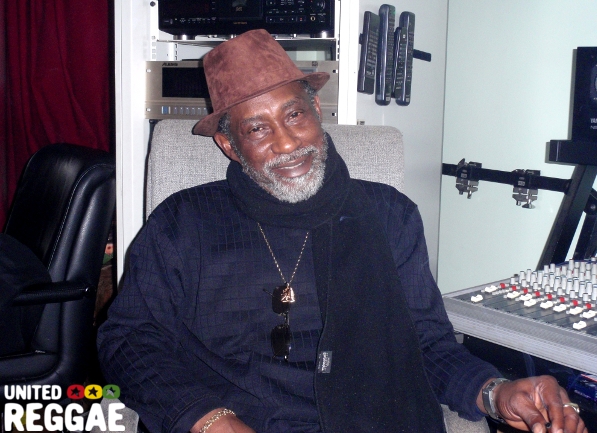
In the late 80s and early 90s your career began to take off in a lovers direction. In 1988 you went to number one with Sugar Love in the reggae charts again. This continued with Strong Love which went to number one in 1991. Did you feel things were coming together at that point?
Well yeah. Because the people had known me from the 70s (there was that collectors reggae crew that knew me from then) but that mass of reggae people didn't know me as such. So when Sugar Love came out, it opened a lot of doors and opened a lot of eyes towards me and it just continued and took off on a wider scale from there.
You won another award in 1991 the Best Male Artist in the British Reggae Industry Awards. Were you aware of winning this time?
Yes yes! I got that! I also got the Best Male Vocalist for I think 94 or something like that but I didn't get the award. I know there was a lot of politics surrounding that. People didn't want the public to see me getting another award again so they just passed it off and kept it to themselves. But I was voted for that as well.
Now we've already mentioned that you were thinking of starting your own label in the early to mid 1980s. At what point did creating your Imperial House label become a reality?
Well I was running another label from '87, with a brethren of mine, Lloydie, where we released Extra Classic Super Fantastic Love in 1989. But 1991 was when the Imperial House label first hit the street. It was the most amazing thing because when you’re in charge of your own thing and doing your own thing it's like you're going out and buying a car. You're going to choose a car that you like, you're going to make sure that car looks nice and presentable all the time, you're going to care for that thing. Well it was like that with me! I was able to present myself how I thought I should be presented. So from that time, 1991, I have been in charge of putting myself out there to the public and I'd say great things have happened since then. It was something that originally I didn't want to get involved in because it's more work and I had enough with producing and singing and writing and putting on shows and stuff like that.
So do you think the lesson there is that you have to be prepared to do everything to control your career?
Of course. And for artist coming up now, it's even more that way. You have to do these things for yourself. You have to start yourself. You have to do the work. You can't shy away from the work because other people will never do the work how you personally want it to be done.
A big hit you had on that label was 1993's Ethiopian Eyes, which, like Red Eyes, brings together what are normally the separate strands of reggae song-writing in one tune. Tell me a bit about that.
Well with Ethiopian Eyes, I was in Jamaica at the time and it wasn't long after my grandfather passed away. I remember I was at the top of a hill and I decided I wanted to develop the depth of my voice a bit more, put more body in my voice. So I would go up to the top of the hill of my yard and start to sing. My grandfather's tomb was at the top of the hill and I would just stand on the tomb at the top of the hill and just sing out! And the song I was singing at the time was Ethiopian Eyes. It was a song that happened because I just wanted to big up the empresses. Big up all the Rasta daughters and all those who know their culture - all the daughters who really big me up. Because I was always hearing songs about 'pretty blue eyes' and 'blue eyes' this and that, so I decided I was going to draw from my own Ethiopian Eyes and that was how the song came.
Another huge success was the Love Is For Lovers album released in 1994.
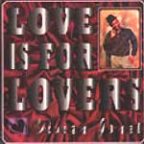
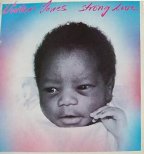 Yeah man that was a massive album. That was one of the biggest selling albums. The Strong Love album was also a big album, but when Love Is For Lovers came out it was following the Strong Love, the Extra Classic and the Sugar Love, so therefore the people were looking for the next big album. So I decided, "Bwoy, I have to give them the next boom album like the Strong Love album" and that was it. When that album came out a lot of people said, "This is your best album so far!! Your best album!!!" and I was laughing because Strong Love was a massive album and I got awards for the Strong Love album. So it was great when a man would say this was my best album after Strong Love you know! (Laughs)
Yeah man that was a massive album. That was one of the biggest selling albums. The Strong Love album was also a big album, but when Love Is For Lovers came out it was following the Strong Love, the Extra Classic and the Sugar Love, so therefore the people were looking for the next big album. So I decided, "Bwoy, I have to give them the next boom album like the Strong Love album" and that was it. When that album came out a lot of people said, "This is your best album so far!! Your best album!!!" and I was laughing because Strong Love was a massive album and I got awards for the Strong Love album. So it was great when a man would say this was my best album after Strong Love you know! (Laughs)
In 1997 you had your own Reggae Max cd released by the big UK distribution company Jet Star (formerly Pama records). Now they went on to have big problems...
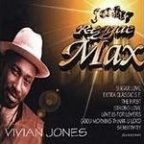 They always had problems! (laughs) If you don't run the business right you're going to have problems! As much as I, as with enough artists here and I know enough artists worldwide, love Mr Palmer and give him support, even by doing that, that still couldn't help Jet Star. Because Jet Star had a problem with not paying - and I suppose that wouldn't be the case for everyone - but there are a lot of people I know who have been through that including me. Your royalties are something that are very difficult to get out of Jet Star and you find after a while that, if you're not prepared to give the people their just reward, one day they're not going to give you anything. And if they're not going to give you anything, then you may try and make it but you'll never make it. This thing here is, each and every one of us is individual, we have our own thing and we have our own flavours, so you can't decide you are going to set up a studio to produce what we produce, that isn't going to work. This was the problem with Jet Star: after a while they didn't get any decent music from decent artists, so they try to go and make their own and then the thing isn't going to work. The thing is going to fall down! That's what happened.
They always had problems! (laughs) If you don't run the business right you're going to have problems! As much as I, as with enough artists here and I know enough artists worldwide, love Mr Palmer and give him support, even by doing that, that still couldn't help Jet Star. Because Jet Star had a problem with not paying - and I suppose that wouldn't be the case for everyone - but there are a lot of people I know who have been through that including me. Your royalties are something that are very difficult to get out of Jet Star and you find after a while that, if you're not prepared to give the people their just reward, one day they're not going to give you anything. And if they're not going to give you anything, then you may try and make it but you'll never make it. This thing here is, each and every one of us is individual, we have our own thing and we have our own flavours, so you can't decide you are going to set up a studio to produce what we produce, that isn't going to work. This was the problem with Jet Star: after a while they didn't get any decent music from decent artists, so they try to go and make their own and then the thing isn't going to work. The thing is going to fall down! That's what happened.
Do you think the UK industry as a whole has problems right now?
The industry right now is unconscious. Critical. That's the way the industry is right now. What happened is the industry built itself without anybody coming in to help. It was because people like Louisa Marks, Carol Thompson, Janet Kay, Trevor Walters, Nereus Joseph, and all the artists that started up in this here scene (including myself), we just loved the music. We started playing the music, and the sound systems and DJs started loving the music, and then the music reached the stage where it was selling. There were times when the UK music was outselling others, even music from Jamaica. But then you got the ego-trippers in the business, people who don't realise this is a real business, an industry that we have here that we have to look after and care for. There was one time when we had so many record shops, so many recording studios, and so many artists and bands doing live shows all around everywhere. Everywhere you'd go there was a band doing live shows and this band just had a record released last week and the vibe was great and the music was selling.
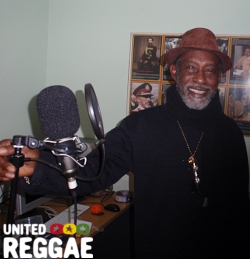 But then you get to the stage now where the DJs tend to start playing the Jamaican music. And this was the dancehall music coming out at the time and it started coming across so they started to play more dancehall music and play the UK music less and less and less. And from the time the UK music went down, even the quality and the standard of the Jamaican music went down because we all feed off of one another. When Sugar Minott came here and heard the Lovers Rock style we were doing and things like that, he made a big song saying, "OK This Is Lovers Rock" which was a massive song he made here. Dennis Brown frequently made songs here. Alton Ellis was living here and made many songs here. John Holt came here and made many songs. We had a beautiful industry going on here but when it gets to where the radio stations started changing and these DJs have their own radio shows and charts, then things started getting messed up.
But then you get to the stage now where the DJs tend to start playing the Jamaican music. And this was the dancehall music coming out at the time and it started coming across so they started to play more dancehall music and play the UK music less and less and less. And from the time the UK music went down, even the quality and the standard of the Jamaican music went down because we all feed off of one another. When Sugar Minott came here and heard the Lovers Rock style we were doing and things like that, he made a big song saying, "OK This Is Lovers Rock" which was a massive song he made here. Dennis Brown frequently made songs here. Alton Ellis was living here and made many songs here. John Holt came here and made many songs. We had a beautiful industry going on here but when it gets to where the radio stations started changing and these DJs have their own radio shows and charts, then things started getting messed up.
Because some of these DJs started taking bribes, and once they start taking bribes, they put a tune at number one and you know it's not number one, the people know that song is not number one, but they are saying it is. It makes the whole thing a farce and discourages people. They kept doing that - they even did that with the Reggae Awards. That's why the Reggae Awards flopped later on after the 80s and 90s the Reggae Awards just flopped because it started getting messed up. Bribery and "this label wants all his artists to get awards" and stuff like "If you sponsor the awards all your label's artists can get awards" and so the people start taking it for a farce.
Can anything be done?
To remedy the whole thing reggae music has to go to the national media now - reggae music can't just stay as reggae music 'on the corner' you know? - but the national media is hell bent on stopping reggae music. So we are at the lowest scale right now when it comes to reggae music in England: we don't have venues to play at, we don't even have proper nightclubs we can go to and hear reggae music. I mean, I personally don't want to go to a nightclub in the West End that's going to play me some 'acid music' and some mad music and all of that. I don't want to go to those places. I know quality, I grew up with quality and that is my music and that's what I want to hear. We don't have a place for that in England and England doesn't really want to promote reggae music. I would even go to the extreme and say they don't want to promote black music. We don't have anybody in the national charts. We don't have any black artists from England who are prominent in the charts. There has been no artist who has been prominent out of England for the last 10 years - we have none! So what happened? There's no black artists in the UK? Something's wrong. So therefore, in reggae music, we know that we never had any help, we've always had to fight this big battle and the battle isn't getting any easier. It's getting harder but that doesn't mean to say we're going to give up. I started my career in England but my career is around the world now. There are people around the world who give me greater respect than what I get here in England. So I can't decide, "I'm going to sit down here in England and wither and die because there's nothing going on". One has to move with the times, so if the people are calling you in Russia - then Russia I'm coming! Simple.
Having achieved independence and success in the late 80s and 90s, in the 00s you consolidated this by focussing on more diverse projects and corners of reggae music. In 2004 you recorded “Tribute to Gugulethu Seven” for the Ghetto Sound label with Azania Band while on tour in South Africa. Tell me about this.
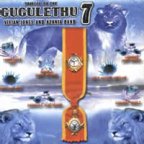 Well in 2004 when I went to South Africa it was like the biggest thing that ever happened in my life. When I say that I mean the biggest experience I ever had to date. Because at the time I went there it was just eight or nine years out of Apartheid so there were a lot of things I saw there that were from the old Apartheid system, and for a man like me who wants everyone to live free and nobody to be captive, it kind of stood up strong and got me aware. I remember that some of the people from the tour were saying I had to go to see Robben Island and I said, "I don't want to go over there because I just gonna get vex and them things just gonna hurt my feelings". And they said, "You must go. You MUST go" and they kept stressing me for at least two days and I decided, "Alright I'm going". So when I went to Robben Island the tour guide had been at one of my shows and he called me to his vehicle (because they drive you around in a vehicle and show you all the different places and stuff) and it was such an experience, a moving experience. I even went into the cell where they had Nelson Mandela. I went into one of the salt mines where they dug out the salt for no reason at all and they figure it helped to destroy their eyesight and their vision - that was the only reason why they had to dig out that place. I saw the biggest gun that fired a big shell miles away. All these things were there on Robben Island to keep the people in bondage - all those prisoners. So that was a very moving experience for me because I am a man who sings against oppression and oppressors all the time so you must understand that after I went over to Robben Island I could write a million songs.
Well in 2004 when I went to South Africa it was like the biggest thing that ever happened in my life. When I say that I mean the biggest experience I ever had to date. Because at the time I went there it was just eight or nine years out of Apartheid so there were a lot of things I saw there that were from the old Apartheid system, and for a man like me who wants everyone to live free and nobody to be captive, it kind of stood up strong and got me aware. I remember that some of the people from the tour were saying I had to go to see Robben Island and I said, "I don't want to go over there because I just gonna get vex and them things just gonna hurt my feelings". And they said, "You must go. You MUST go" and they kept stressing me for at least two days and I decided, "Alright I'm going". So when I went to Robben Island the tour guide had been at one of my shows and he called me to his vehicle (because they drive you around in a vehicle and show you all the different places and stuff) and it was such an experience, a moving experience. I even went into the cell where they had Nelson Mandela. I went into one of the salt mines where they dug out the salt for no reason at all and they figure it helped to destroy their eyesight and their vision - that was the only reason why they had to dig out that place. I saw the biggest gun that fired a big shell miles away. All these things were there on Robben Island to keep the people in bondage - all those prisoners. So that was a very moving experience for me because I am a man who sings against oppression and oppressors all the time so you must understand that after I went over to Robben Island I could write a million songs.
So how did you become involved in the Gugulethu Seven project?
Well before we went to Robben Island, we were rehearsing, and there was a brother there who was really loving the music (it was the first time they'd heard me) and he called me to one side when we were having a break, saying he wanted to tell me about seven brothers who got murdered in 1983. He started telling me about the Gugulethu Seven and how they were murdered and the police planted guns on them to say that they were terrorists so they could increase the budget for Apartheid for the next year. So these seven men got killed so they increase their budget of oppression on the people. He said to me that nothing had ever been done for them and he would like me to do something - a song. I said, “A song? We gonna do an LP. We gonna do an album for them".
I had about two weeks left for the tour so we started working night and day - as soon as we finished rehearsing we started recording. And the studio we were recording in was in Gugulethu itself, way down in the ghetto, so you can imagine the studio wasn't great quality so it was double work. Sometimes we'd voice a song and when I'd voiced it they couldn't find the voice or it had never recorded so I'd have to voice it again. So in two weeks we went through voicing the tracks, plus we incorporated some of the local artists from the ghetto - we'd just bring them in, and anybody who could sing well would get the opportunity to make a tune. But when the brother said he wanted us to do something for the Seven he didn't tell us that there were eight of them and one got away. He was the one that got away. So then he told me all about the things that happened: how he had to hide in the bushes and lay down for hours with helicopters overhead searching to see if there were any more people there. But they didn't find him and he got away.
So when we'd done this album I came back to England but they didn't really know how to release the album and get the thing done and sorted out so I took it upon myself to bring the album back here, got it mastered, did the artwork for the sleeve here with pictures that I took with my camera while I was there. I pressed some and took them back to South Africa and started spreading it around and the people started loving it because it was the first time in the local community that something like that happened - an album released and made in the ghetto. We had a very good following from it, a lot of people came to the shows and were singing the songs when we played them on stage. The whole crowd were singing so it was really good. Now that album is still in South Africa, it was never released anywhere else. I suppose it be released at the end of the day. But for now, it's available online from Ghetto Sound and on download sites.
Is South Africa a third home to you after UK and Jamaica?
(Laughs) Not so much as the UK and Jamaica! But South Africa is a place that embraced me in such a way that, yes, I could go there and live. And, yes, I really love the place. It's a place where I can feel my ancestors who were brutally murdered and chastised in the days of Apartheid, their energy is around me. I can feel their energy around me and it just feels wonderful to be in that place. And such a beautiful place! An amazing place that I think people should go and have a look at with a good standard of life there as well. So yeah man - love it!
In 2008 you focussed on your own history with the album released 50th in celebration of your 50th birthday including many old rhythms by Bunny Lee.
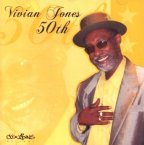 (Laughs) Well for that album I first voiced a couple of tracks for Black Arrow, Donville Davis, and they were really loving these tracks. So I kind of got this idea, because I was coming up to 50 years old, that I wanted to do something for my 50th that I will remember for the rest of my days. So I decided to do this album. I said, "Well, bwoy, these are some of the riddims that I was listening to as a youth growing up. I learned to sing off of some of these riddims and I never think the day would come when I would actually be singing on these same original riddims that some of my great singers who step up before me, who teach me, have done". So Donville said, "Yeah alright" and started getting more and more rhythms. Every week he's giving me more and more rhythms saying, "Bunny Lee say nobody never sing 'pon this one here you know?" and "Bunny Lee say this a good riddim to go on". And so we sat down and I picked out quite a few of them and started voicing them. Now this album was one where we voiced all over England. I voiced some of the songs in Birmingham, I voiced some in London, I voiced some all about. But at the end of the day I wanted some good quality out of it all and I wanted them to sound proper. I wrote the songs for that album I wrote while I was doing the album. So some of the songs just reflected on the mood I was in, what I was doing or how I felt at the time. But the main thing about it all was that whatever I did on these rhythms had to be quality because of the men who sang on these rhythms before me. So I wanted every song to stand out to a certain level.
(Laughs) Well for that album I first voiced a couple of tracks for Black Arrow, Donville Davis, and they were really loving these tracks. So I kind of got this idea, because I was coming up to 50 years old, that I wanted to do something for my 50th that I will remember for the rest of my days. So I decided to do this album. I said, "Well, bwoy, these are some of the riddims that I was listening to as a youth growing up. I learned to sing off of some of these riddims and I never think the day would come when I would actually be singing on these same original riddims that some of my great singers who step up before me, who teach me, have done". So Donville said, "Yeah alright" and started getting more and more rhythms. Every week he's giving me more and more rhythms saying, "Bunny Lee say nobody never sing 'pon this one here you know?" and "Bunny Lee say this a good riddim to go on". And so we sat down and I picked out quite a few of them and started voicing them. Now this album was one where we voiced all over England. I voiced some of the songs in Birmingham, I voiced some in London, I voiced some all about. But at the end of the day I wanted some good quality out of it all and I wanted them to sound proper. I wrote the songs for that album I wrote while I was doing the album. So some of the songs just reflected on the mood I was in, what I was doing or how I felt at the time. But the main thing about it all was that whatever I did on these rhythms had to be quality because of the men who sang on these rhythms before me. So I wanted every song to stand out to a certain level.
And in 2009 you've created a "one away" DJ and Soundman album that's not available to the public called One Way Exclusive. On it you've used some rhythms from Jamaican "one-drop" producers like Donovan Bennett and Christopher Birch. Do you think there's a connection between these "one-drop" rhythms like the Dropleaf and the reggae music of yesterday?
Yeah. Definitely. If you remember the Lovers Rock music that we made in the UK or even now with the music we make in the UK, we tend to have more ingredients than most of the producers in Jamaica. With the Jamaican producers you'll find it's more like they build a solid rhythm and they can mix that solid rhythm to make it sound big and sweet and nice. But with us, we make a rhythm and we tend to put in guitars, we tend to put in organ, horns - we put in a lot of different flavours. That's not to say Jamaicans don't do this - but not as much as the way we do it. Only certain big time original producers would do that. So today most of the rhythms there are just basic instruments. Well Don Corleon was one of the Jamaican producers I noticed that uses a lot of guitars and stuff like this, so those rhythms are more appealing to people who are musically minded. Because a lot of people are dancehall minded, which means you're not so much into instrumentation and stuff like that.
There's one other tune from that album, on an older rhythm, Diverse Doctrine, called Live Hate where you criticize the 2005 Live 8 concert. Tell me about the background to this song.
Well when they had the Live 8, the last big one down at Hyde Park, they had all these people there and no reggae people there. And yet they're doing something for Africa? If you do something for Africa you have to bring reggae music in to it because from day one reggae is the music that started singing about Africa. Reggae music started singing about, 'Free Mandela', reggae music started singing about the Ethiopian King, reggae music sang about Africa all the while because we are Africans and we're singing about our homeland. So when they're going to have something as big as that in England and leave out all of the reggae artists, that's a farce. A big farce. So we can burn fire upon that because that's not right.
You can't segregate people who want to help. Segregating because of their colour or their music - you can't do that. We're supposed to be a multiracial society they run here in England so we're supposed to reflect that. And we should reflect that upon TV, upon the radio, in every walk of life. But I can tell you - take it from a black man, Vivian Jones - it doesn't. And when you go around England you'll find there is so much talent, young talent, black talent - and I mean real talent not some little joke rubbish talent. But if these talents don't have a platform how are they going to get through? We can't rely upon X Factor because it is a joke. X Factor is not about talent - it’s about, "come up here and if you look like that and gwaan like that then you're alright". We want something real that accommodates real talent and right now we don't find that. The thing is a one way thing. We need to bring in some of the youths from here who were born here because if you have a great youth growing up playing football you know he is going to end up playing for England. It should be the same thing for music. It should be the same thing for anything. That is not how it is right now and we need to get that straight because black people will forever be here.
In 2005 the organisers of Live 8 responded to criticism about the lack of African artists saying it was all about featuring the artists that would sell enough tickets to raise more money. What do you think of that?
Rubbish that! Because if they say that then they might as well say only white artists are good enough. They're not saying anything for us. And another thing about it is, talent is talent. So if you're doing something for Africa let's have some of our talent there as well. After all, we are African. Let's put some of our talent there and stop undermining it because it's going to sell anyway. And who says if they had some more black artists in there they wouldn't have more people? Because then you get more black people coming? But no, they have to segregate the thing. Apartheid system.
Isn't this the same segregation of the music industry has been happening since the 20th Century began?
Yeah it's been there. But we've come a long way and there were times where, as I said to you earlier on, I once did shows with Chas & Dave. I once did shows with Adam and the Ants and it was no problem. But then people start saying, "maybe these people are going to jump ahead of us or be on the same level as us and we can't have that" and then they start playing tricks and doing all kinds of things. What stops a reggae tune from being played on national radio? Nothing should stop a decent reggae tune from playing on the radio. And if you are a conscious one and love reggae music you're not going to want profanity to be played to represent the real reggae. You're not going to want rubbish to represent the real thing. You're going to want real music, real people and real instruments playing. Take it from me, in years to come we won't even be able to find a decent reggae drummer because nobody will be playing live instruments any more. We need to get the thing straight and get the youths back in the youth clubs and youth centres playing music, playing table tennis, doing things. But I don't think the government is really interested in the people's wellbeing. I don't think they really care for us because if they did they would do more for the people and care for the people. But everything seems to be like, "Let's find a way to charge the people more money. Let's find a way to put them under more pressure. Let's stop them from having a good time. Let's give them some mind control so we can control them. Let's control every single person". We are human beings and we are natural people.
What else have you got in the pipeline?
I have an important project to do in Jamaica that's going to take me some time and take me out of the UK for a while. I'm going to try to build my house in Jamaica that my grandparents told me to build so that might take some time out of the business. But right now I'm making notes for a film about the reggae industry in the UK and we're going to be talking to all the artists, the producers, the pressing men, shops who were there and shops who were not there anymore. I'm going to talk to a lot of people in the business and let them speak for themselves so the people can hear what we go through. We're making notes for that to start in the new year 2010. Also I'm going to South Africa again to finish some recordings that I started there that will be on a new album for 2010 and do a couple more shows over there as well. So watch out for a new Vivian Jones album and we'll be getting on with the filming.
Do you have a working title for the film?
Reggae Music Ah England. It might change but I don't think it can go too far from that because it's all about that. And we hope to have a lot of people talking including some people that have never been heard before.
The untold story.
That's right. The half that's never been told.
Photos copyright Angus Taylor 2009
Reproduction without permission of United Reggae and Angus Taylor is prohibited.
Read more about this topic
Read comments (1)
| Posted by Camille on 02.20.2010 | |
| It is really interesting to get all this infos about Vivian Jones' career. | |
Comments actually desactivated due to too much spams
Browse by categories
Recommended Articles
Latest articles
Recently addedView all
© 2007-2026 United Reggae. All Rights Reserved. Reproduction in whole or in part is prohibited. Read about copyright
Terms of use | About us | Contact us | Authors | Newsletter | A-Z














